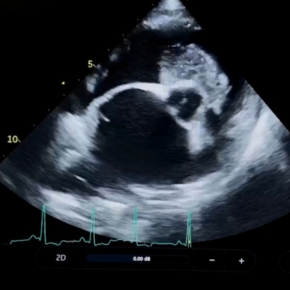
How pimobendan can change echocardiographic findings
Avoid misclassification of mitral valve disease in dogs receiving pimobendan

We’ve all heard the phrase “If it looks like a duck, swims like a duck and quacks like a duck…it’s probably a duck”. In Veterinary medicine this reminds us that while pattern recognition is essential, a full history and thorough examination are equally important. In general practice, narrowing down differential diagnoses can be a momentous task – especially when client expectations are high and financial implications are tighter than ever before. In veterinary cardiology, we are lucky to have robust guidelines and groundbreaking studies to help support our patients more than ever. The ‘in-house’ diagnostic capabilities of many practices are now of a very high standard, really helping improve clinical decision making in practice.
If you’re a referring vet in the South West, Gloucestershire, South Wales and beyond, get in touch with our team at HeartVets to discuss your case in more detail.
Gone are the days when a “heart murmur” or “puppy murmur” was a sufficient diagnosis. Just as labelling something as an “arrhythmia” without an ECG falls short. Even if a patient appears asymptomatic, a murmur may still be serious, and early intervention can improve or even save lives. Conversely, a murmur doesn’t always explain the clinical signs. Medicating without diagnosis not only burdens clients with costs but also risks causing harm, delaying identification of primary disease or masking concurrent pathology.
Echocardiography should now be the foundation for diagnosis and appropriate staging for any cardiac disease. In the right hands, it unlocks the door to diagnosis clarity, client education, treatment guidance and prognostic information. We know from published guidelines that initiating treatment at specific time points in common acquired structural disease (such as degenerative (myxomatous) mitral valve disease) can hugely improve patient outcome and longevity, so there is little excuse for presumed diagnoses and trial treatment in this age.
We are proud to see many general practitioners embracing basic echocardiography and arrhythmia categorisation through targeted training. By empowering vets to perform preliminary tests, we enhance both client communication and disease management. At HeartVets, we fully support and encourage this – we offer regular echocardiography courses to help first opinion practitioners to perform their own basic in-house screening, which can narrow down the numbers of patients requiring referral for a definitive diagnosis. But as per the RCVS Code of Professional Conduct, we’re all responsible for ensuring clients understand the level of expertise involved in their pet’s care. Clear communication strengthens trust and helps manage expectations. Clients should always know that referral is an option and should be encouraged where advanced diagnostics aren’t available in-house, patients have possible concurrent disease, congenital pathology or clinical signs requiring treatment plans or medication optimisation.
So back to that duck…
If you’re not 100% sure whether:
…then it’s probably time to consider a referral. And if you’re not sure? Just ask. We’re always happy to help.
For colleagues and referring vets in the South West, Gloucestershire, South Wales and beyond, get in touch with HeartVets today to see how we can support you and your patients.

Avoid misclassification of mitral valve disease in dogs receiving pimobendan

Understand how left atrial size can cause a cough in dogs with mitral valve disease in our article.